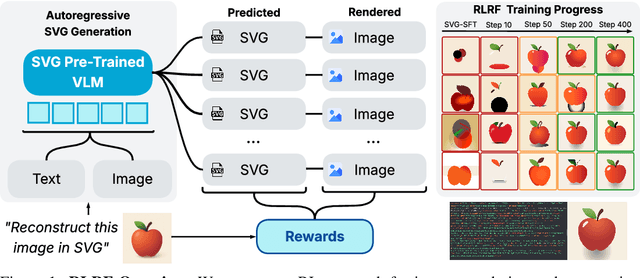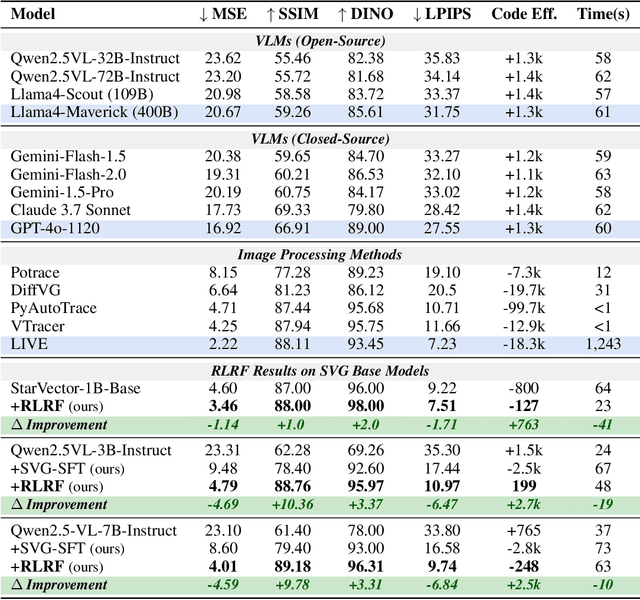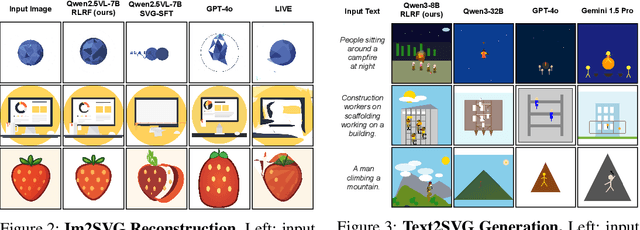Rishav Pramanik
SANEval: Open-Vocabulary Compositional Benchmarks with Failure-mode Diagnosis
Jan 30, 2026Abstract:The rapid progress of text-to-image (T2I) models has unlocked unprecedented creative potential, yet their ability to faithfully render complex prompts involving multiple objects, attributes, and spatial relationships remains a significant bottleneck. Progress is hampered by a lack of adequate evaluation methods; current benchmarks are often restricted to closed-set vocabularies, lack fine-grained diagnostic capabilities, and fail to provide the interpretable feedback necessary to diagnose and remedy specific compositional failures. We solve these challenges by introducing SANEval (Spatial, Attribute, and Numeracy Evaluation), a comprehensive benchmark that establishes a scalable new pipeline for open-vocabulary compositional evaluation. SANEval combines a large language model (LLM) for deep prompt understanding with an LLM-enhanced, open-vocabulary object detector to robustly evaluate compositional adherence, unconstrained by a fixed vocabulary. Through extensive experiments on six state-of-the-art T2I models, we demonstrate that SANEval's automated evaluations provide a more faithful proxy for human assessment; our metric achieves a Spearman's rank correlation with statistically different results than those of existing benchmarks across tasks of attribute binding, spatial relations, and numeracy. To facilitate future research in compositional T2I generation and evaluation, we will release the SANEval dataset and our open-source evaluation pipeline.
Rendering-Aware Reinforcement Learning for Vector Graphics Generation
May 27, 2025



Abstract:Scalable Vector Graphics (SVG) offer a powerful format for representing visual designs as interpretable code. Recent advances in vision-language models (VLMs) have enabled high-quality SVG generation by framing the problem as a code generation task and leveraging large-scale pretraining. VLMs are particularly suitable for this task as they capture both global semantics and fine-grained visual patterns, while transferring knowledge across vision, natural language, and code domains. However, existing VLM approaches often struggle to produce faithful and efficient SVGs because they never observe the rendered images during training. Although differentiable rendering for autoregressive SVG code generation remains unavailable, rendered outputs can still be compared to original inputs, enabling evaluative feedback suitable for reinforcement learning (RL). We introduce RLRF(Reinforcement Learning from Rendering Feedback), an RL method that enhances SVG generation in autoregressive VLMs by leveraging feedback from rendered SVG outputs. Given an input image, the model generates SVG roll-outs that are rendered and compared to the original image to compute a reward. This visual fidelity feedback guides the model toward producing more accurate, efficient, and semantically coherent SVGs. RLRF significantly outperforms supervised fine-tuning, addressing common failure modes and enabling precise, high-quality SVG generation with strong structural understanding and generalization.
Distilling semantically aware orders for autoregressive image generation
Apr 23, 2025Abstract:Autoregressive patch-based image generation has recently shown competitive results in terms of image quality and scalability. It can also be easily integrated and scaled within Vision-Language models. Nevertheless, autoregressive models require a defined order for patch generation. While a natural order based on the dictation of the words makes sense for text generation, there is no inherent generation order that exists for image generation. Traditionally, a raster-scan order (from top-left to bottom-right) guides autoregressive image generation models. In this paper, we argue that this order is suboptimal, as it fails to respect the causality of the image content: for instance, when conditioned on a visual description of a sunset, an autoregressive model may generate clouds before the sun, even though the color of clouds should depend on the color of the sun and not the inverse. In this work, we show that first by training a model to generate patches in any-given-order, we can infer both the content and the location (order) of each patch during generation. Secondly, we use these extracted orders to finetune the any-given-order model to produce better-quality images. Through our experiments, we show on two datasets that this new generation method produces better images than the traditional raster-scan approach, with similar training costs and no extra annotations.
Masked Multi-Query Slot Attention for Unsupervised Object Discovery
Apr 30, 2024Abstract:Unsupervised object discovery is becoming an essential line of research for tackling recognition problems that require decomposing an image into entities, such as semantic segmentation and object detection. Recently, object-centric methods that leverage self-supervision have gained popularity, due to their simplicity and adaptability to different settings and conditions. However, those methods do not exploit effective techniques already employed in modern self-supervised approaches. In this work, we consider an object-centric approach in which DINO ViT features are reconstructed via a set of queried representations called slots. Based on that, we propose a masking scheme on input features that selectively disregards the background regions, inducing our model to focus more on salient objects during the reconstruction phase. Moreover, we extend the slot attention to a multi-query approach, allowing the model to learn multiple sets of slots, producing more stable masks. During training, these multiple sets of slots are learned independently while, at test time, these sets are merged through Hungarian matching to obtain the final slots. Our experimental results and ablations on the PASCAL-VOC 2012 dataset show the importance of each component and highlight how their combination consistently improves object localization. Our source code is available at: https://github.com/rishavpramanik/maskedmultiqueryslot
An Adaptive and Altruistic PSO-based Deep Feature Selection Method for Pneumonia Detection from Chest X-Rays
Aug 06, 2022



Abstract:Pneumonia is one of the major reasons for child mortality especially in income-deprived regions of the world. Although it can be detected and treated with very less sophisticated instruments and medication, Pneumonia detection still remains a major concern in developing countries. Computer-aided based diagnosis (CAD) systems can be used in such countries due to their lower operating costs than professional medical experts. In this paper, we propose a CAD system for Pneumonia detection from Chest X-rays, using the concepts of deep learning and a meta-heuristic algorithm. We first extract deep features from the pre-trained ResNet50, fine-tuned on a target Pneumonia dataset. Then, we propose a feature selection technique based on particle swarm optimization (PSO), which is modified using a memory-based adaptation parameter, and enriched by incorporating an altruistic behavior into the agents. We name our feature selection method as adaptive and altruistic PSO (AAPSO). The proposed method successfully eliminates non-informative features obtained from the ResNet50 model, thereby improving the Pneumonia detection ability of the overall framework. Extensive experimentation and thorough analysis on a publicly available Pneumonia dataset establish the superiority of the proposed method over several other frameworks used for Pneumonia detection. Apart from Pneumonia detection, AAPSO is further evaluated on some standard UCI datasets, gene expression datasets for cancer prediction and a COVID-19 prediction dataset. The overall results are satisfactory, thereby confirming the usefulness of AAPSO in dealing with varied real-life problems. The supporting source codes of this work can be found at https://github.com/rishavpramanik/AAPSO
* Accepted in Applied Soft Computing, Elsevier
A Brief Overview of Physics-inspired Metaheuristic Optimization Techniques
Jan 30, 2022Abstract:Metaheuristic algorithms are methods devised to efficiently solve computationally challenging optimization problems. Researchers have taken inspiration from various natural and physical processes alike to formulate meta-heuristics that have successfully provided near-optimal or optimal solutions to several engineering tasks. This chapter focuses on meta-heuristic algorithms modelled upon non-linear physical phenomena having a concrete optimization paradigm, having shown formidable exploration and exploitation abilities for such optimization problems. Specifically, this chapter focuses on several popular physics-based metaheuristics as well as describing the underlying unique physical processes associated with each algorithm.
 Add to Chrome
Add to Chrome Add to Firefox
Add to Firefox Add to Edge
Add to Edge